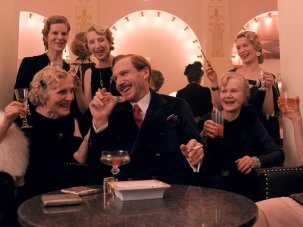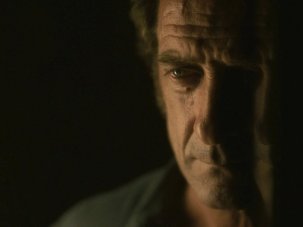
This month’s issue catches up with the king of American indie cool himself, Jim Jarmusch, whose remarkable new film Only Lovers Left Alive, starring Tom Hiddleston and Tilda Swinton, sees him tackle the vampire genre as he only he could do.
Posted to subscribers and available digitally 7 February
→
→ Sign up / log in
On UK newsstands 11 February
Nick Pinkerton caught up with Jarmusch for a long conversation in a New York diner, at which the epitome of the hip culture vulture pondered how great it would be to be an eternal vampire and have all that time to read every book ever written, listen to every great record ever made, see all the films we can never hope to squeeze into a human lifetime and travel the world. They also find time to talk about Nicholas Ray, Ernst Lubitsch, Tangiers, Christopher Marlowe and whether or not a certain William Shakespeare was all he’s been claimed.
Another figure whose cultural interests and influences extended far beyond the cinema was Derek Jarman, who died 20 years ago this year. Part punk prophet, part-English traditionalist, Jarman was a man whose occult interests sat side by side with an earthy political engagement. William Fowler reappraises his legacy.
If Jarman was someone who very clearly engaged with political and social events of his time, Wes Anderson has always seemed to prefer the perfection of his own, impeccably crafted fantasy worlds. His latest film, The Grand Budapest Hotel, bears the distinct influence of Lubitsch. He talks to Isabel Stevens.
If Anderson is channelling Lubitsch, Lars von Trier’s epic and characteristically controversial Nymph()maniac channels the Marquis de Sade in a complex odyssey of sexual desire. But is its central character any more than an empty vessel for the director to offload his often provocative ideas about women, asks Nick James?
Similarly controversial for its explicit sexual content is Alain Guiraudie’s Stranger by the Lake, which revamps the sullied reputation of erotic thrillers with its tense tale of obsession and murder. Catherine Bray considers one of the most provocative and interesting films of recent times.
Our final two features also concern films that deal with the darker edges of behaviour. Claire Denis’s latest film, Bastards, is a harrowing journey into the heart of darkness, loosely inspired by William Faulkner’s Sanctuary. She talks to Nick Roddick.
Ted Kotcheff’s cult 1970s classic Wake in Fright meanwhile is a brutal exploration of masculinity and violence in the Australian outback that has at last been restored and revived. He talks to Clare Stewart about bringing it back for a new generation.
Also in this month: Bob Mastrangelo’s obituaries round-up of the film greats and lesser-knowns who left us during 2013, Kim Newman on Al Pacino in Sidney Lumet’s great cop film Serpico, Melissa Gronlund on the beguiling installation work of Turner Prize-winner Laure Prouvost, reports from the Sundance and Rotterdam festivals, Olaf Möller on the Spanish filmmaker Gonzalo García Pelayo, John Wyver on a history of British television – and much more besides…
-
Sight & Sound is now available in digital editions for Apple iOS, Android and Kindle Fire as well as computer desktops. Scroll this gallery to browse this issue’s sections.
-
RUSHES: China’s box-office king Feng Xiaogang, An Oversimplification of Her Beauty’s Terence Nance, five key film poster scandals, plus Hannah McGill on motor scooters in the movies and Mark Cousins on steps and stumbles in the creative process.
-
THE INDUSTRY: The making of Starred Up; this year’s Oscar hopefuls; how the UK film industry needs a benefactor with deep pockets; Cuban Fury producer Nira Park, and changes at the BBFC.
-
FESTIVALS: Eric Kohn on the hits and misses at this year’s Sundance; Edward Lawrenson reports from this year’s Rotterdam.
-
Lars von Trier’s Nymph()maniac channels the Marquis de Sade in a complex odyssey of sexual desire. But is its central character any more than an empty vessel for the director to offload his often provocative ideas about women? By Nick James.
-
French filmmaker Alain Guiraudie has revamped the sullied reputation of erotic thrillers with Stranger by the Lake, a tense tale of obsession that boasts one of the most memorable screen murders in years. By Catherine Bray.
-
The spirit of Ernst Lubitsch lives on in Wes Anderson’s The Grand Budapest Hotel, a screwball set over several decades in a fictional Eastern European country. He talks to Isabel Stevens.
-
Ted Kotcheff’s cult classic Wake in Fright is a brutal exploration of masculinity and violence in the Australian outback. He talks to Clare Stewart about bringing it back for a new generation.
-
Part punk prophet, part English traditionalist, Jarman was a man whose occult interests sat side by side with an earthy political engagement. Twenty years after his death, we reappraise his legacy. By William Fowler.
-
Claire Denis’s latest film, Bastards, is a harrowing journey into the heart of darkness. She talks to Nick Roddick.
-
Bob Mastrangelo’s survey of the film greats and lesser-knowns who left us during 2013.
-
The S&S Interview: Jarmusch tells Nick Pinkerton about the joys of music, books and travelling – and about his latest film, Only Lovers Left Alive, a characteristically unconventional take on the vampire myth, starring Tom Hiddleston and Tilda Swinton.
-
WIDE ANGLE: the little-seen films of Gonzalo García Pelayo, Derek Jarman’s use of music, a programme of silent-era colour films and the beguiling installations of Turner Prize winner Laure Prouvost.
-
FILMS OF THE MONTH: Stranger by the Lake, Bastards, An Oversimplification of Her Beauty plus 21 more new releases.
-
HOME CINEMA: Kim Newman revisits Sidney Lumet’s Pacino-starring cop drama Serpico; Philip Horne on Gavin Millar and Dennis Potter’s magical Dreamchild, plus 17 more releases reviewed.
-
BOOKS: Armchair Nation: An Intimate Study of Britain in Front of the TV; Global Mexican Cinema: Its Golden Age; BFI Film Classics: Nosferatu; First Films of the Holocaust: Soviet Cinema and the Genocide of the Jews, 1938-46.
-
ENDINGS: Pasquale Iannone on the liberating finale to Claire Denis’s Beau Travail.
Features
COVER FEATURE: The S&S Interview – Jim Jarmusch
As a director who has often embraced elements of genre cinema, from westerns and prison-break films to samurai and hitmen, it was perhaps only a matter of time before he turned his attention to vampires. Here, he explains his unconventional take on the subject in Only Lovers Left Alive, a darkly comic tale of enduring love among the undead, and why he was determined to drive a stake through viewers’ expectations. Interview by Nick Pinkerton.
The story of ( )
Lars von Trier’s hugely inventive two-part Nymph()maniac sees him channelling the Marquis de Sade in a complex, absurd and often very funny odyssey of sexual desire. But is its central character any more than an empty vessel for the director to offload his often provocative ideas about women? By Nick James.
Dead calm
The winner of the Un Certain Regard Best Director award at Cannes, French filmmaker Alain Guiraudie has revamped the sullied reputation of erotic thrillers with Stranger by the Lake, a tense tale of obsession that boasts one of the most memorable screen murders in years. By Catherine Bray.
The Anderson touch
The spirit of Ernst Lubitsch lives on in Wes Anderson’s fast-quipping screwball caper The Grand Budapest Hotel, a chase extravaganza set over several decades in a fictional Eastern European country. Here, the director talks about the writing process, how he maintained the plot’s frantic pace and why sadness and tragedy haunt the film’s atmosphere. By Isabel Stevens.
Intruder in the dust
Ted Kotcheff’s cult classic ‘Wake in Fright’ is a brutal exploration of masculinity and violence in the Australian outback. Here, the director explains why it took a seven-year search for the missing negative to bring it back for a new generation. By Clare Stewart.
English magus: the many faces of Derek Jarman
Part punk prophet, part English traditionalist, Jarman was a man whose occult interests sat side by side with an earthy political engagement. Twenty years after his death, it’s time to reappraise the legacy of an enigmatic artist, filmmaker, designer, activist and dreamer. By William Fowler.
Dark matters
At once elliptical and confrontational, Claire Denis’s films have often proved challenging viewing. With her latest, Bastards, a harrowing drama about a man returning to comfort his sister after the suicide of her husband, she travels even deeper into the heart of darkness. By Nick Roddick.
Obituaries
Bob Mastrangelo’s survey of the film greats and lesser-knowns who left us during 2013, including Peter O’Toole, Les Blank, Joan Fontaine, Kay Mander and Alexei German.
Regulars
Editorial
Actors and the indie deluge.
Rushes
In the frame: The man with the Midas touch
Look beyond the commercial success of his films and you’ll find a director of true artistic merit in Feng Xiaogang. By Simon Fowler.
Object lesson: Engine of change
The motor scooter came to represent working class dreams of escape in the years after World War II. By Hannah McGill.
The five key… Poster rows
Every now and then a film poster campaign turns bus shelters into sites of contestation. Is there really no such thing as bad publicity? By Ashley Clark.
First sight: How he felt
Director and star Terence Nance explains how An Oversimplification of Her Beauty grew out of a single brief phone-call in 2006. By Sam Davies.
Dispatches: Seeing the wood for the trees
The process of filmmaking involves a number of steps, and sometimes a lot of them are stumbles. By Mark Cousins.
The Industry
Development tale: Starred Up
It took years of creative writing courses and a lot of professional advice for Jonathan Asser to get recognised as a newcomer. By Charles Gant.
The numbers: Oscar contenders
Brewster: We’re no angles
British film has plenty of homegrown creative talent and ideas but what it needs are some bold investors. By Ben Roberts.
Profile: Nira Park
While other British film producers steer clear of comedy, Nira Park of Big Talk is laughing all the way to the bank. By Geoffrey Macnab.
Word on the wire: Film classification
Trying to fathom the reasoning behind the BBFC’s guidelines may lead to strong language, mild fantasy violence and threat. By Justin Johnson.
Festivals
Sundance: Around the world in 11 days
The indie magnet might be famous for its US-focused fare but this year’s best films had a truly international flavour. By Eric Kohn.
Rotterdam: The future is unwritten
Despite its successes, the festival needs to address the challenges posed by reduced budgets and dwindling industry influence. By Edward Lawrenson.
Wide Angle
Rediscovery: Andalusian gambles
Still undervalued even at home, the films of Gonzalo García Pelayo offer a suitably complex portrait of Spain under and after Franco. By Olaf Möller.
Soundings: Making a nice party
Derek Jarman’s early shorts set the template for a filmmaker who collated great music without seeming to care too much about it. By Daniel Barrow.
Primal scream: The world of silent cinema
Paris’s Toute la mémoire du monde festival offered an eye-opening survey of early experiments in colour. By Bryony Dixon.
Artists’ moving image: Trust me, I’m an artist
With her installation-based video work, Turner Prize-winner Laure Prouvost aims less to depict than to convince, or even beguile. By Melissa Gronlund.
Reviews
Films of the month
Stranger by the Lake/L’Inconnu du lac
Bastards/Les Salauds
An Oversimplification of Her Beauty
plus reviews of
Bounty Killer
Cuban Fury
Devil’s Due
Fonzy
47 Ronin
The Grand Budapest Hotel
Grudge Match
The Harry Hill Movie
I, Frankenstein
Jack Ryan: Shadow Recruit
Love Is in the Air/Amour & turbulences
Nymph()maniac Volume 1
Nymph()maniac Volume 2
1/1: Life on the Limit
Only Lovers Left Alive
Paranormal Activity: The Marked Ones
Ride Along
The Square/Al Midan
Stalingrad
That Awkward Moment
Tim’s Vermeer
Walking with Dinosaurs
DVD features
Good cops, bad cops: Serpico
A turning point in American cinema’s portrayal of the police, Serpico shows its cop hero battling corruption within the ranks. By Kim Newman.
plus reviews of
Battle for Music
Films by James Benning
Betty Blue
Il bidone
Big Trouble in Little China
Films by Charles Chaplin
Cinerama Travelogues
The Epic of Everest
Eyes Without a Face
The Other
Perestroika/Perestroika Reconstructed
The Stuart Hall Project
La Vie de Bohème
The Year of the Cannibals
Television reviews
Civvies
Elementary – Season 1
The Tunnel
Lost and found
Dreamchild
Gavin Millar’s film, written by Dennis Potter, offers an entrancing look at Lewis Carroll through the eyes of the elderly Alice. By Philip Horne.
Books
John Wyver on a fascinating social history of British television.
Paul Julian Smith on a study of the golden age of Mexican cinema.
Brad Stevens enjoys a monograph on Murnau’s classic Nosferatu.
Sue Vice reviews a groundbreaking study of Soviet cinema and the Holocaust.
Letters
Mark Cousins’ takes on framing and critics, Robert Redford played a reprehensible bastard, more period dramas, and race in The Hunger Games’ District II.
Endings
Beau Travail
The finale of Claire Denis’s story of jealousy and repressed desire in the French Foreign Legion is a dance between life and death. By Pasquale Iannone.
Further reading
-
The Digital Edition and Archive quick link
Log in here to your digital edition and archive subscription, take a look at the packages on offer and buy a subscription.









